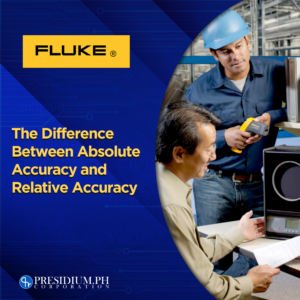Importance of regular infrared inspections
Having a regular infrared inspection in the workplace in terms of keeping the quality of the systems and retain its efficiency. Infrared cameras like the Fluke Ti450 and Fluke TiS65 are very ideal for evaluating apparent temperature differences between components or materials that might lead to a system problem.
Infrared cameras are ideal for finding apparent temperature differences between components or materials that can point to a potential problem. With advanced focus systems, IR-Fusion technology, color alarms, and user-defined spot markers can help you find problems fast. IR Cameras are applicable on troubleshooting various systems such as:
Electrical Systems
Through an infrared camera, you can capture thermal information without actual contact which makes it safer to inspect electrical system. From a safe distance you can actually check on the following potential system problems:
- Unbalanced loads
- Possible harmonics issues
- Overloaded systems with excessive current
- Loose or corroded connections that cause increased resistance in the circuit
- Winding insulation failure in electric motors
- Component failure
- Wiring mistakes
- Underspecified components
Electromechanical Systems
When it comes to inspecting motors, pumps, turbines, heat exchangers, gear boxes, and low-speed rotating equipment, the non-contact temperature capability of Fluke Infrared Cameras can detect:
- Reduced airflow from dust or debris
- Alignment issues
- Motor winding insulation problems
- Power quality problems
- Bearing issues
- Lubrication problems
Process Operations
Various processes that involve extreme temperatures and potentially hazardous conditions, like petroleum and chemical processing, can all benefit from the efficiency of infrared cameras. Using a Fluke infrared camera to inspect refractory structures, tanks, vessels, steam systems, and heaters and furnaces, can help you find:
- Damaged refractory insulation
- Worn or leaking pipes
- Defective valves and steam traps
- Abnormal heat flow and heat gradients
- Levels of solids, liquids, or gases in vessels such as storage tanks and silos
Building Diagnostics
Infrared cameras are also being used to both residential and commercial building inspections in order to diagnose:
- Improperly installed or missing insulation
- Heat loss or gain
- Air leakage and air bypasses
- Improperly installed or damaged HVAC ductwork
- Leaks in buried steam or water lines
- Moisture intrusion in walls, ceilings and roofs causing damage to insulation and building materials
For the best infrared cameras and other testing tools, Presidium.PH is your reliable partner! We are an official distributor of Fluke Industrial and Calibration products. Contact us at +63 2 464 9339 or email us at info@presidium.ph!



